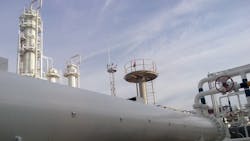Quiz Corner: Location of differential pressure flow transmitter for steam service
Where and how should a differential pressure flow transmitter be located for steam service?
A. Above the flow element with the impulse tubes sloping upward to the transmitter
B. Above the flow element with the impulse tubes sloping upward then downward to the transmitter
C. Below the flow element with the impulse tubes sloping upward then downward to the transmitter
D. Below the flow element with the impulse tubes sloping downward to the transmitter
Accurately transmitting the differential pressure generated by the flow element to the differential pressure transmitter in steam service is somewhat complicated — as compared to liquid or gas service — because steam is both hot and condensable. Being hot, it is not desirable to have steam in direct contact with the transmitter. However, cooling the steam will cause it to condense and form liquid. Accurate steam measurement can be achieved despite these seemingly contradictory constraints by allowing steam to condense and accumulate where it does not affect the measurement and, in effect, forms a liquid seal.
Answer A is not correct because it allows live steam to directly contact the transmitter. Answer B, Answer C and Answer D provide for a liquid seal to isolate the transmitter from the steam and could be correct if implemented properly.
Additional complicating factors
The impulse tubing installation should ensure (1) that the liquid seals generate the same pressure under zero flow conditions at the high and low ports of the differential pressure transmitter or (2) that the transmitter calibration corrects for any difference.
David W. Spitzer is a principal at Spitzer and Boyes, LLC, which offers engineering, focused market research, writing/editing white papers, strategic marketing consulting, distribution consulting, seminars and expert witness services for manufacturing and automation companies. Spitzer has written more than 400 technical articles and 10 books about flow measurement, instrumentation and process control. He can be reached at 845-623-1830 or via spitzerandboyes.com.
David W. Spitzer
David W Spitzer’s new book Global Warming (aka Climate Change): An Understandable Data-Driven Explanation and Pathway to Mitigation (Amazon.com) adds to his over 500 technical articles and 10 books on flow measurement, instrumentation, process control and variable speed drives. David offers consulting services and keynote speeches, writes/edits white papers, presents seminars, and provides expert witness services at Spitzer and Boyes LLC (spitzerandboyes.com or +1.845.623.1830).


